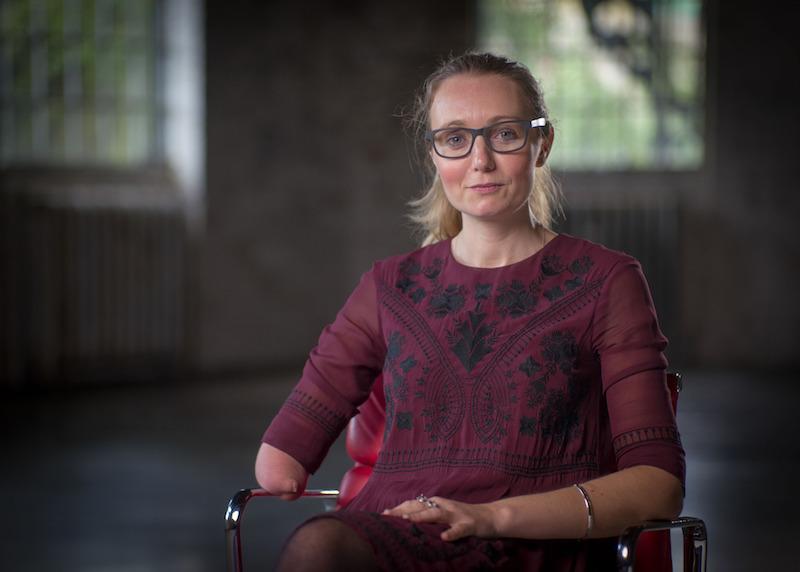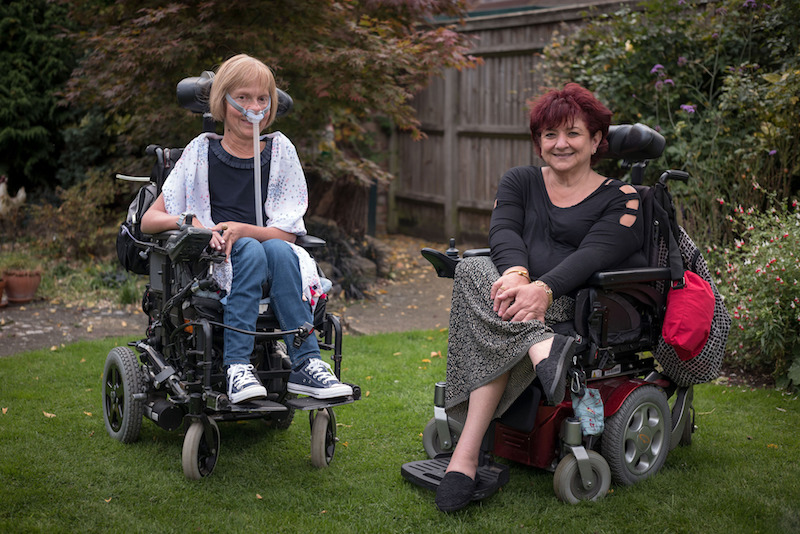Silenced: The Hidden Story of Disabled Britain, BBC Two review - documentary fails to deliver | reviews, news & interviews
Silenced: The Hidden Story of Disabled Britain, BBC Two review - documentary fails to deliver
Silenced: The Hidden Story of Disabled Britain, BBC Two review - documentary fails to deliver
Worthy programme flawed by the omission of the learning-disabled

What a television programme gets called is not always the choice of the people making it, but it certainly is the choice of its broadcaster. In the case of Silenced: The Hidden Story of Disabled Britain, the relevant people at the BBC may come to regret giving an otherwise decent documentary that title.
She interviewed disabled people and several wheelchair-using campaigners, who had fought for equal access, mainstream schooling and independent living; all of them were very impressive. Burnell herself vividly described being fitted with uncomfortable, ineffective prosthetic limbs as a child, negative attitudes from her tutors at drama school and the outcry from prejudiced parents when she appeared as a regular presenter on CBeebies. But the programme-makers did not interview anyone with learning disabilities, despite there being several high profile figures who could have been included (actors like Sarah Gordy and campaigners like Gary Bourlet, for example).
This omission was particularly galling given the programme’s title; it was as if learning disabled people were still silenced, still hidden away from view. It wasn’t as if they weren’t mentioned – there were frequent references to terms like "feebleminded" and footage from the eugenics movement propaganda films of the 1930s that aimed to prevent "defectives" having children themselves. In search of history, the programme took the familiar route mapped out for this TV genre. The BBC covered similar ground in David Hevey’s three-parter, The Disabled Century. This time around Burnell met an archivist who had studied institutional care at the Sandlebridge Colony, with its wealth of photographic records from the early 20th century. She detailed how the industrial revolution led to dumping those who could not work into institutions. Places like Sandlebridge may have been set up with ideals, but over the years, they evolved into warehouses for the "mentally deficient". Sandlebridge became the Mary Dendy hospital and Burnell interviewed two elderly brothers who discovered in 2007 that they had an older sister who had been confined there for 70 years without their knowledge.
Parents of children with Down Syndrome were briefly mentioned as effective campaigners for inclusion in mainstream education. But where were the voices of learning disabled people today? There’s no shortage of them available to be interviewed and able to speak for themselves, as demonstrated by Saba Salman’s Made Possible, an excellent collection of essays written by people with learning disabilities who describe their lives today in a very positive way. But such voices were silenced by the programme’s desire to tell the stirring stories that came out of pioneering work at Stoke Mandeville hospital, the Paralympics and the Charter for the 1980s movement.
 It’s always inspiring to hear from great campaigners like Alia Hassan (above right) and Baroness Jane Campbell (above left) about their battles for equal rights against the odds. It is uplifting to see Judy Hunt describe her late husband Paul Hunt, who in the early Eighties was one of the pioneers of the social model of disability, which argues that society imposes disability on physically impaired people by the way they are isolated and excluded from participation in the world. I also particularly enjoyed the archive from the 1990s showing disability campaigners’ attacks on the patronising telethons that portrayed disabled people as objects of pity and which constituted for a long time the only representation that broadcasters felt was worth putting on screen.
It’s always inspiring to hear from great campaigners like Alia Hassan (above right) and Baroness Jane Campbell (above left) about their battles for equal rights against the odds. It is uplifting to see Judy Hunt describe her late husband Paul Hunt, who in the early Eighties was one of the pioneers of the social model of disability, which argues that society imposes disability on physically impaired people by the way they are isolated and excluded from participation in the world. I also particularly enjoyed the archive from the 1990s showing disability campaigners’ attacks on the patronising telethons that portrayed disabled people as objects of pity and which constituted for a long time the only representation that broadcasters felt was worth putting on screen.
Micheline Mason and her daughter Lucy were great on their human rights campaign for disabled children to be included in mainstream schools. But there was no time in the programme for any acknowledgement that sometimes special schools can be the best place for some students with physical disabilities, as well as some with learning disabilities and autism. Recently BBC Wales demonstrated this in the excellent three part series, A Special School. And while there was a brief attempt to bring the situation of disabled Britons up to date with a reference to austerity eroding independent living, the programme failed to mention that as of 2020, large scale institutions where learning disabled people are kept, sometimes against their and their families’ wishes, are still very much a feature of Britain.
There are over 2,000 people in the UK with autism and/or learning disabilities in expensive (and to a great part ineffective) Assessment and Treatment Units, despite repeated abuse scandals, which the media have covered, but they were not mentioned here. Instead we were given the impression that institutional care was a thing of the distant past. But large-scale psychiatric hospitals like St Andrews, founded in 1838, are still housing autistic and learning disabled people, despite coming under scrutiny by the Care Quality Commission and the Charity Commission. It was a shame that Silenced: The Hidden Story of Disabled Britain did not find time for these stories or the fact that people with learning disabilities are six times more likely to die of Covid than their unaffected peers, but mostly it was a shame that an otherwise good programme about physical disability had such a misleading title.
rating
Explore topics
Share this article
Add comment
The future of Arts Journalism
You can stop theartsdesk.com closing!
We urgently need financing to survive. Our fundraising drive has thus far raised £49,000 but we need to reach £100,000 or we will be forced to close. Please contribute here: https://gofund.me/c3f6033d
And if you can forward this information to anyone who might assist, we’d be grateful.

Subscribe to theartsdesk.com
Thank you for continuing to read our work on theartsdesk.com. For unlimited access to every article in its entirety, including our archive of more than 15,000 pieces, we're asking for £5 per month or £40 per year. We feel it's a very good deal, and hope you do too.
To take a subscription now simply click here.
And if you're looking for that extra gift for a friend or family member, why not treat them to a theartsdesk.com gift subscription?
more TV
 Down Cemetery Road, Apple TV review - wit, grit and a twisty plot, plus Emma Thompson on top form
Mick Herron's female private investigator gets a stellar adaptation
Down Cemetery Road, Apple TV review - wit, grit and a twisty plot, plus Emma Thompson on top form
Mick Herron's female private investigator gets a stellar adaptation
 theartsdesk Q&A: director Stefano Sollima on the relevance of true crime story 'The Monster of Florence'
The director of hit TV series 'Gomorrah' examines another dark dimension of Italian culture
theartsdesk Q&A: director Stefano Sollima on the relevance of true crime story 'The Monster of Florence'
The director of hit TV series 'Gomorrah' examines another dark dimension of Italian culture
 The Monster of Florence, Netflix review - dramatisation of notorious Italian serial killer mystery
Director Stefano Sollima's four-parter makes gruelling viewing
The Monster of Florence, Netflix review - dramatisation of notorious Italian serial killer mystery
Director Stefano Sollima's four-parter makes gruelling viewing
 The Diplomat, Season 3, Netflix review - Ambassador Kate Wyler becomes America's Second Lady
Soapy transatlantic political drama keeps the Special Relationship alive
The Diplomat, Season 3, Netflix review - Ambassador Kate Wyler becomes America's Second Lady
Soapy transatlantic political drama keeps the Special Relationship alive
 The Perfect Neighbor, Netflix review - Florida found-footage documentary is a harrowing watch
Sundance winner chronicles a death that should have been prevented
The Perfect Neighbor, Netflix review - Florida found-footage documentary is a harrowing watch
Sundance winner chronicles a death that should have been prevented
 Murder Before Evensong, Acorn TV review - death comes to the picturesque village of Champton
The Rev Richard Coles's sleuthing cleric hits the screen
Murder Before Evensong, Acorn TV review - death comes to the picturesque village of Champton
The Rev Richard Coles's sleuthing cleric hits the screen
 Black Rabbit, Netflix review - grime and punishment in New York City
Jude Law and Jason Bateman tread the thin line between love and hate
Black Rabbit, Netflix review - grime and punishment in New York City
Jude Law and Jason Bateman tread the thin line between love and hate
 The Hack, ITV review - plodding anatomy of twin UK scandals
Jack Thorne's skill can't disguise the bagginess of his double-headed material
The Hack, ITV review - plodding anatomy of twin UK scandals
Jack Thorne's skill can't disguise the bagginess of his double-headed material
 Slow Horses, Series 5, Apple TV+ review - terror, trauma and impeccable comic timing
Jackson Lamb's band of MI5 misfits continues to fascinate and amuse
Slow Horses, Series 5, Apple TV+ review - terror, trauma and impeccable comic timing
Jackson Lamb's band of MI5 misfits continues to fascinate and amuse
 Coldwater, ITV1 review - horror and black comedy in the Highlands
Superb cast lights up David Ireland's cunning thriller
Coldwater, ITV1 review - horror and black comedy in the Highlands
Superb cast lights up David Ireland's cunning thriller
 Blu-ray: The Sweeney - Series One
Influential and entertaining 1970s police drama, handsomely restored
Blu-ray: The Sweeney - Series One
Influential and entertaining 1970s police drama, handsomely restored
 I Fought the Law, ITVX review - how an 800-year-old law was challenged and changed
Sheridan Smith's raw performance dominates ITV's new docudrama about injustice
I Fought the Law, ITVX review - how an 800-year-old law was challenged and changed
Sheridan Smith's raw performance dominates ITV's new docudrama about injustice

Comments
I agree - great to see some
Thanks very much for your
Shame to have a review pan a
Could you find out from BBC
Could you find out from BBC presenter if they would allow me to script of conversation between activist or email adresses as it would prove useful for college project we are doing on hidden disabilities
Sorry Anne, I don't have any
Sorry Anne, I don't have any direct access to the BBC presenter - suggest you contact the BBC yourself and see if they will give you a transcript.